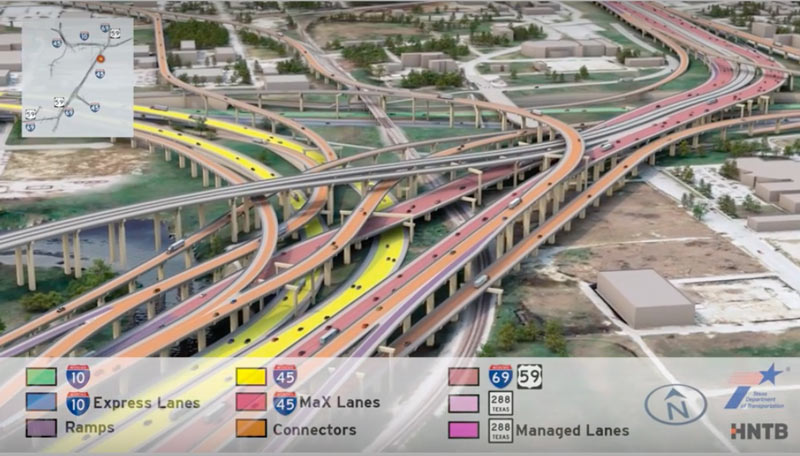Urban planner Jeff Speck is once again warning us about the negative effects of widening I-45.
TxDOT cites three principal motivations for advancing the I-45 project: reducing traffic congestion, improving driver safety, and improving air quality. These laudable goals are apparently considered important enough to outweigh the significant costs discussed above. And they might be — if they were achievable.
Sadly, each one is a false promise. Decades of similar state projects around the U.S., each with its own ample justification, teach a simple lesson: highway widenings do not reduce congestion in the long run, and make both driver safety and air quality worse.
[…]
If I-45 is widened, it will be remembered that, in the decade prior, Houston enjoyed a brief glimpse of a better future. Downtown and Midtown have been reborn, lifted on a demographic shift that favors urban living. Regional bike trails grace the Bayou Greenways, and a brilliant Beyond the Bayous plan lays out an ambitious path for sustainable growth. Transit ridership is up, thanks to investment in light rail and a redesigned bus network. The mayor, members of city council, and county commissioners all sing the praises of a more walkable Houston. Sadly, all these trends will be reversed if Houston doubles down on its nation-leading commitment to fossil-fuel infrastructure.
This need not happen. Houston has the ability to stop the I-45 expansion in its tracks, just as Dallas stopped the Trinity Parkway. That proposed roadway was called “the worst boondoggle imaginable” despite costing only one-fifth of the current I-45 plan. It took a 10-year fight, but the good people of Dallas rose up and killed it.
Meanwhile, Houston’s fatalistic response to its TxDOT incursion has been to just “make I-45 better.” The well-resourced but cautious Make I-45 Better Coalition has proposed a collection of modifications, all good, that unfortunately do not begin to question the underlying folly of fighting congestion, car crashes, and tailpipe emissions by welcoming more driving.
Here’s how to make I-45 better: first, fix the parts that need repair, without making them any wider. At the same time, introduce congestion-based pricing on the entire roadway to maximize its capacity around the clock. Invest the proceeds in transit, biking, walking, and in those poor people who truly have no choice but to keep driving.
Unlike highway widenings, congestion-based pricing reduces traffic, driving deaths, and pollution, all while earning billions rather than wasting them. It has worked wherever it’s been tried, including London, Stockholm, and Sydney, and it is about to become law in New York City. Even Dallas has been experimenting with congestion-based pricing for years.
Speck has addressed the I-45 expansion plan before, and I find him very compelling. The problem, as I’ve said before, is that there is no current mechanism in Texas to do the things he advocates. TxDOT, as the name implies, is a state agency, with leaders appointed by the Governor. Houston has no authority to impose any kind of pricing on I-45, and TxDOT also has no authority under current law to do congestion pricing, because TxDOT does not operate the toll roads and toll-based HOV lanes that do have that kind of authority. The now-dead Trinity Parkway project was not a TxDOT project but a local project under the auspices of a regional toll road authority.
What I’m saying is that the fight over I-45 isn’t in Houston, it is – or it needs to be – in Austin, in the Legislature and the Governor’s mansion. You want TxDOT to have a different mission, one that emphasizes transit over highway widening, you need a different Legislature and a different Governor. You want cities to have the authority to impose congestion pricing rules, with the revenue to be used to boost non-automobile mobility, you need to get that new Legislature to pass a law allowing for it, and a Governor to sign it. We can take one step towards those goals next year, but the Governor and the Senate aren’t up for grabs till 2022 (yes, there are Senators on the ballot in 2020, but only one Republican-held seat is a realistic target, and that won’t be enough). What do we do till then? The Make I-45 Better Coalition may be a limited response to a big problem, but at least their goals are achievable in the current time frame. If we want to think big – and we should! – we also have to play the longer game.


The Make I-45 Better Coalition has made candidate presentations at their meeting this past weekend available for viewing on their Facebook page. Watching all of them gave me the impression that the “resistance is futile” meme is NOT in play for any of them.
Speck’s premise and reasoning falls flat. Houstonians are being essentially offered $7 billion in transportation infrastructure – I45 needs work and improvements. Why would Houston city council turn down 7 Billion dollars for highway infrastructure ?
Speck’s logic was pretty faulty. My response here:
http://houstonstrategies.blogspot.com/2019/09/response-to-jeff-specks-anti-45n.html